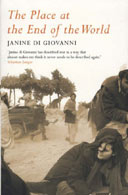
The Place at the End of the World
by Janine di Giovanni
Bloomsbury £8.99, pp432
Sometimes, books by journalists recounting their tales of derring-do can be quite boring. Indeed, the recent books of several household names spring to mind, as does their well-deserved remaindered fate. This book does not fall into this category. Not only does it deserve attention but, more importantly, I think it will stand the test of time.
Janine di Giovanni, who has worked for the Times and Vanity Fair, seems to have covered every major conflict from Sarajevo to Sierra Leone, via Afghanistan and Iraq. This book is a collection of much of her best work but what makes it interesting is that it is not just that. If it were a straightforward collection of frontline tales, as graphic and heartrending as they are, I don't know if that would have been enough. What makes this book is the interlacing of war stories with her story.
I think I must be about the same age as di Giovanni and I have covered many of the same conflicts, for this paper and others. What I have found is that, from speaking at my children's school and to other audiences, what interests people most is often not so much the 'Who did what to whom' stuff but the 'What was it like? What were you thinking?' Blood and guts and raw emotion are fine, but people want more than that.
So we learn how di Giovanni suddenly snapped out of a dull but comfortable life and marriage in the United States to begin covering the Middle East. Later, writing about the siege of east Mostar in Bosnia, she says: 'In that limited, dangerous world, I was strangely happy.' Leaving Bosnia for a weekend to see her then boyfriend, she writes that she felt like she was 'missing a limb' and worries that she might not be able to return.
Afterwards, she says something that everyone who covered the war, and, equally, Bosnians, must surely identify with. 'I could not forget the dead. They were everywhere I looked. And when I went back to Sarajevo over and over after the war, they were still there - hanging around the brand-new Benetton shop or the internet cafe or the Mexican restaurant that served bad margaritas ... They followed me around like warm, grey clouds.'
Bosnia is only a small part of this book, but, in a way, it is the most important because, as di Giovanni says, Bosnia was for love, but the rest were duty. Then she has her private wars. She struggles, against the medical odds, to become pregnant and when she succeeds, she says: 'I developed an emotion that had lain dormant in me for many years: fear.'
Why, some may ask, is this interesting? Surely we need to hear the voices of the victims. Well, they are here, but the autobiographical part of this book is its leaven. And that is important. When I was a teenager, my aunt gave me Anyone Here Been Raped and Speaks English?, a book by an American foreign correspondent called Edward Behr. It was the proverbial tome that changed my life. I suspect this one may change a few in the next generation, especially girls. I am going to go and leave my copy on my 15-year-old daughter's bedside table right now.

